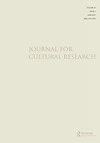光合作用:与光在一起的基础
IF 0.6
Q1 CULTURAL STUDIES
引用次数: 0
摘要
有人建议我们转向太阳能地球工程来对抗全球变暖,这将最终改变陆地植物与太阳的关系。这篇文章不是关于地球工程本身,而是关于所谓的光合作用,或者,思考我们与光的道德关系——特别是,因为它是由植物介导的。从内部出发,但随后扩展了伊曼纽尔·列维纳斯作品中发现的责任观念,这里有人认为,既然植物通过光合作用培育了地球上的生命条件,那么它与太阳的关系就是一种给予他人的关系,这是合乎道德的。植物的存在与人类理解存在的方式是如此格格不入,以至于它打断了我们自己的方式,把我们带入了一种责任关系。结论是,我们不应该改变太阳辐射的方向,而应该转向植物,以重新考虑我们如何在一个不断加热的星球上与光共存。首先,这意味着将道德责任从人类的视野中分离出来,这样我们就可以以自己的方式遇到光明,而不仅仅是作为理性、情感或纪律的元素。本文章由计算机程序翻译,如有差异,请以英文原文为准。
Photosynethics: a groundwork for being with the light
It has been suggested that we turn to solar geoengineering to counter global warming, which would consequently transform the relationship of terrestrial plant-life to the sun. This is an article not about geoengineering as such, but instead what is called photosynethics, or, thinking about our moral relationship to the light – in particular, as it is mediated by plants. Working from within but then extending the idea of responsibility found in the work of Emmanuel Levinas, it is argued here that, since the plant cultivates the conditions of life on earth by photosynthesis, its relationship to the sun is then a relation of giving to others that is properly moral. The plant’s existence is an exposure so out of kilter with human ways of understanding existence that it interrupts our own and brings us into a relation of responsibility. It is concluded that rather than redirecting the sun’s radiation, we should turn to plants to reconsider how we live with the light on a heating planet. This first means separating moral responsibility from human vision so that we might encounter light on its own terms, and not simply as an element of rationality or sentiment or discipline.
求助全文
通过发布文献求助,成功后即可免费获取论文全文。
去求助
来源期刊

Journal for Cultural Research
CULTURAL STUDIES-
CiteScore
1.40
自引率
0.00%
发文量
23
期刊介绍:
JouJournal for Cultural Research is an international journal, based in Lancaster University"s Institute for Cultural Research. It is interested in essays concerned with the conjuncture between culture and the many domains and practices in relation to which it is usually defined, including, for example, media, politics, technology, economics, society, art and the sacred. Culture is no longer, if it ever was, singular. It denotes a shifting multiplicity of signifying practices and value systems that provide a potentially infinite resource of academic critique, investigation and ethnographic or market research into cultural difference, cultural autonomy, cultural emancipation and the cultural aspects of power.
 求助内容:
求助内容: 应助结果提醒方式:
应助结果提醒方式:


